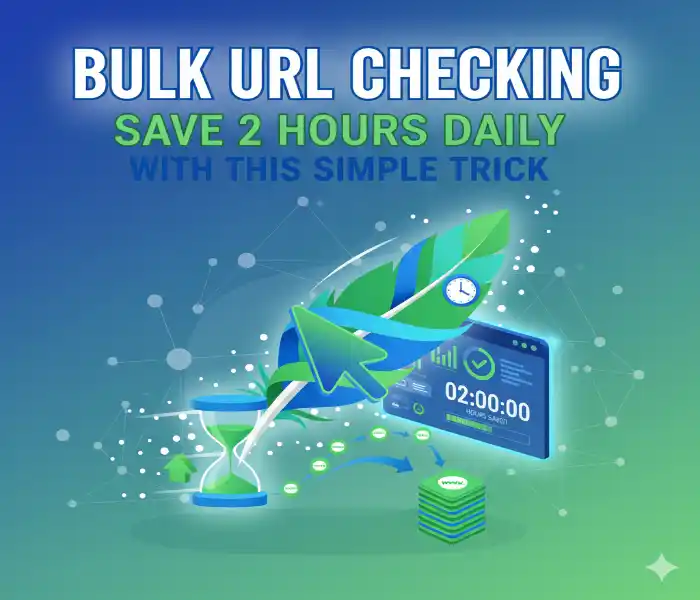Picture this: It’s 3 PM on a Tuesday, and I’m sitting here manually checking URLs… again.
Click. Copy. Paste. Check status. Repeat 200 more times.
My back aches, my eyes are strained, and I’ve just wasted 2 hours of my life on something that should take minutes.
Sound familiar?
If you’re nodding your head right now, you’re in for a treat.
I’m about to show you how a bulk URL checker transformed my daily SEO workflow and gave me back those precious 2 hours every single day.
What is a Bulk URL Checker and Why Every SEO Professional Needs One
Let me be blunt: If you’re still checking URLs manually, you’re working like it’s 2005.
A bulk URL checker is a digital marketing tool that analyses multiple URLs simultaneously, checking their HTTP status codes, redirect chains, and server responses in seconds rather than hours.
Think of it as your personal SEO assistant that never gets tired, never makes mistakes, and processes hundreds of URLs whilst you grab a coffee.
Understanding HTTP Status Codes and Redirect Analysis
Here’s what happens when you visit any website:
Your browser sends a request to the server.
The server responds with a status code.
That code tells you exactly what’s happening with that URL.
The most common status codes you’ll encounter:
- 200 OK – Everything’s working perfectly
- 301 redirect – Permanent move to new location
- 302 redirect – Temporary move
- 404 error – Page not found
- 403 access denied – You’re not allowed here
- 504 unresponsive – Server timeout
Without proper redirect analysis, you’re flying blind.
The Hidden Cost of Manual URL Checking on Website Performance
I learned this the hard way during a site migration project.
500 URLs to check. Manual process. One by one.
Halfway through, I realised I’d missed 15 broken links that were hemorrhaging link equity.
Those broken links were costing my client hundreds of potential visitors daily.
The manual approach didn’t just waste my time – it was actively hurting search engine rankings.
How Bulk URL Checking Tools Save 2 Hours Daily in SEO Workflows
Let’s do some quick maths:
Manual checking: 30 seconds per URL
Bulk tool checking: 0.5 seconds per URL
For 200 URLs:
- Manual: 100 minutes (1 hour 40 minutes)
- Bulk tool: 1.5 minutes
Add in the time for analysis and documentation, and you’re looking at 2+ hours of daily time savings.
That’s 10 hours per week.
520 hours per year.
Enough time for a proper holiday.
Automated Status Code Verification vs Manual Processes
Manual checking is like using a spoon to dig a swimming pool.
You’ll get there eventually, but why would you?
Automated verification gives you:
- Instant results across hundreds of URLs
- Consistent accuracy without human error
- Real-time updates on server responses
- Detailed reporting for client presentations
- Time freedom for strategic SEO work
Time Reduction Strategies for Large-Scale Website Audits
Here’s my proven workflow for maximum efficiency:
Before bulk checking:
- Prepare your URL list in proper formats
- Remove duplicates
- Group by domain or section
During bulk analysis:
- Use browser-based tools for flexibility
- Export results to CSV for deeper analysis
- Focus on critical issues first
After processing:
- Prioritise 404 errors and broken redirects
- Document redirect chains longer than 3 hops
- Create action plans for development teams
Productivity Enhancement Through Batch Processing
Batch processing is the secret weapon of efficient SEO professionals.
Instead of checking URLs sporadically throughout the day, I dedicate 15 minutes each morning to bulk analysis.
This approach gives me:
- Complete visibility into site health
- Predictable daily workflow
- Better time management
- Reduced mental fatigue
Essential Features Every Bulk URL Status Checker Must Have
Not all bulk URL checkers are created equal.
After testing dozens of tools, here are the non-negotiable features:
HTTP Status Code Detection (200, 301, 302, 404, 403, 504)
Your tool must accurately identify all major status codes.
I’ve seen tools that miss 302 redirects or misreport 404 errors.
These mistakes can cost you rankings and traffic.
Redirect Chain Analysis and HTTPS Redirect Verification
Redirect chains are SEO killers.
Each redirect in a chain dilutes link equity and slows page load times.
Your bulk checker should:
- Map complete redirect paths
- Identify chain length
- Highlight HTTPS redirect issues
- Flag meta refresh and JavaScript redirects
Multiple User Agent Support (Googlebot, Bingbot, Desktop Browsers)
Here’s something most people miss:
Different user agents see different responses.
What Chrome sees might be completely different from what Googlebot encounters.
Essential user agents to test:
- Desktop browsers (Chrome, Firefox, Safari, Microsoft Edge)
- Mobile devices (iPhone, Android)
- Search engine bots (Googlebot, Bingbot)
CSV Export and Response Headers Analysis
Raw data is useless without proper analysis.
Look for tools that export:
- Complete response headers
- Canonical header information
- X-Robots-Tag data
- Processing timestamps
- Final destination URLs
Top Use Cases: When SEO Professionals Use Bulk URL Checkers
I use bulk URL checkers for virtually every SEO task.
Here are the most common scenarios:
SEO Audits and Website Health Checks
Monthly health checks keep websites running smoothly.
I check:
- All main navigation URLs
- Blog post archives
- Product pages
- Internal link structures
- External partner links
Site Migration and Pre-Launch Testing
Site migrations are terrifying without proper URL validation.
Before any launch, I verify:
- All old URLs redirect properly
- New URL structure is accessible
- No redirect chains exist
- Mobile and desktop responses match
Competitor Research and Link Analysis
Understanding competitor link profiles gives strategic advantages.
I analyse:
- Competitor internal linking patterns
- External link destinations
- Redirect strategies
- Site architecture decisions
Broken Link Detection and Internal Link Mapping
Broken links are ranking poison.
Regular bulk checking helps identify:
- 404 errors across the site
- Broken internal links
- Outdated external references
- Redirect opportunities
Free vs Paid Bulk URL Checking Tools: Complete Comparison
The eternal question: free or paid?
Here’s my honest assessment after years of testing:
Browser-Based Tools vs Desktop Applications
Browser-based advantages:
- No installation required
- Cross-platform compatibility
- Team collaboration features
- Automatic updates
- Universal access
Desktop application benefits:
- Higher processing limits
- Advanced features
- Offline capability
- Custom configurations
Google Sheets Integration and Click Consult Solutions
Google Sheets integration is a game-changer for team workflows.
Click Consult’s bulk URL status checker offers:
- Simple paste-and-run functionality
- Built-in formulas for analysis
- Free access without sign-up
- Instant results export
Processing Limits and Batch Size Considerations
Free tools typically limit you to 15-50 URLs per batch.
Paid solutions handle hundreds or thousands simultaneously.
For most daily tasks, free tools are sufficient.
For large-scale audits, investment in premium tools pays dividends.
Step-by-Step Guide: Using a Bulk URL Checker for Maximum Efficiency
Let me walk you through my exact process:
URL Format Preparation (HTTP, HTTPS, WWW Variations)
Proper formatting prevents processing errors.
Accepted formats:
https://example.comhttp://www.example.comexample.comwww.example.com
Pro tip: Most tools auto-complete incomplete URLs, but consistency improves accuracy.
Running Your First Bulk Analysis
- Collect your URLs
- Export from crawling tools
- Copy from spreadsheets
- Extract from sitemaps
- Paste into the checker
- One URL per line
- Remove extra spaces
- Check for duplicates
- Select user agent
- Choose based on your goal
- Test multiple agents for comprehensive analysis
- Run the analysis
- Processing takes 1-5 minutes typically
- Don’t close the browser tab
- Wait for completion confirmation
Interpreting Results and Identifying Critical Issues
Results interpretation determines your next actions.
Priority 1 issues:
- 404 errors on important pages
- Redirect chains over 3 hops
- HTTPS redirect failures
Priority 2 issues:
- Slow server responses
- Temporary 302 redirects
- Missing canonical headers
Priority 3 issues:
- Optimisation opportunities
- Redirect consolidation
- Performance improvements
Advanced Bulk URL Checking: Redirect Chains and Link Equity Analysis
This is where bulk URL checking becomes powerful.
Understanding 301 vs 302 Redirects for SEO
301 redirects signal permanent moves and pass full link equity.
302 redirects indicate temporary changes and may not pass full SEO value.
Common mistakes I see:
- Using 302s for permanent moves
- Creating unnecessary redirect chains
- Missing HTTPS upgrades
Meta Refresh and JavaScript Redirect Detection
Not all redirects happen at the server level.
Meta refresh redirects happen in the HTML head section.
JavaScript redirects execute after page load.
Both can impact SEO differently than server-side redirects.
Advanced bulk checkers detect these alternative redirect methods.
Canonical Header and X-Robots-Tag Verification
Response headers reveal crucial SEO information.
Canonical headers prevent duplicate content issues.
X-Robots-Tag controls search engine indexing.
Bulk analysis helps identify:
- Missing canonical declarations
- Conflicting indexing instructions
- Header implementation errors
Workflow Automation: Integrating Bulk URL Checkers into Daily SEO Tasks
Automation transforms bulk URL checking from reactive to proactive.
Content Creator and Web Data Researcher Applications
Content creators use bulk checkers for:
- Research link validation
- Source verification
- Reference quality checks
- Content audit processes
Web data researchers benefit from:
- Large dataset validation
- Automated quality control
- Efficient data collection
- Research workflow optimisation
Team Collaboration and Cross-Platform Accessibility
Modern SEO requires team coordination.
Browser-based tools enable:
- Shared result access
- Collaborative analysis
- Real-time updates
- Universal compatibility
No more “it works on my machine” problems.
Campaign Verification and Landing Page Monitoring
Paid advertising demands URL reliability.
I use bulk checkers to verify:
- Campaign landing pages
- Affiliate link destinations
- Partner integrations
- Seasonal page availability
Common Bulk URL Checking Mistakes That Cost Rankings
Learn from my expensive mistakes:
Ignoring Redirect Chain Problems
Redirect chains kill page speed and dilute link equity.
I once discovered a 7-redirect chain on a client’s homepage.
Each redirect added 200ms of load time.
Search engines stopped following after the 4th redirect.
Solution: Limit chains to maximum 1-2 redirects.
Missing Mobile vs Desktop User Agent Differences
Mobile and desktop can return completely different responses.
A client’s mobile site was serving 404 errors whilst desktop worked perfectly.
We lost 60% of organic traffic before discovering the issue.
Solution: Always test multiple user agents.
Overlooking Server Response Time Issues
Bulk checkers reveal performance patterns invisible in manual testing.
Slow server responses appear as patterns across multiple URLs.
Individual page testing misses systemic problems.
Solution: Monitor response times during bulk analysis.
Future-Proof Your SEO: Best Practices for Bulk URL Management
SEO evolves constantly, but these principles remain:
Regular Domain Expiration Monitoring
Expired domains break link equity and user experience.
Include domain expiration checks in monthly audits.
Set calendar reminders 90 days before expiration dates.
Automated Workflow Implementation
Manual processes don’t scale.
Set up automated:
- Weekly URL health checks
- Monthly comprehensive audits
- Pre-launch verification protocols
- Post-update validation procedures
Performance Optimization Through Efficient URL Analysis
Efficiency improves with experience and better tools.
Optimise your process:
- Use templates for common checks
- Create standard operating procedures
- Document recurring issues
- Build knowledge bases for teams
Frequently Asked Questions
How many URLs can I check at once with free bulk URL checkers?
Most free tools allow 15-50 URLs per batch. Premium tools handle hundreds to thousands simultaneously. For daily SEO tasks, free tools are usually sufficient.
Do bulk URL checkers work with all browsers?
Yes, browser-based bulk URL checkers work across Chrome, Firefox, Safari, Microsoft Edge, and Internet Explorer. This cross-platform compatibility makes them ideal for team environments.
How accurate are automated bulk URL status checks?
Modern bulk URL checkers are highly accurate, often more reliable than manual checking due to elimination of human error. However, always verify critical issues manually before implementing fixes.
Can I export bulk URL checker results for reporting?
Most quality tools offer CSV export functionality, allowing easy integration with spreadsheets, reporting tools, and client presentations. Look for tools that include response headers and timestamps in exports.
How often should I run bulk URL checks on my website?
I recommend daily checks for critical pages and weekly comprehensive audits. During site migrations or major updates, check before and immediately after changes. Monthly deep audits catch issues before they impact rankings.
What’s the difference between checking URLs with different user agents?
Different user agents (Googlebot, mobile browsers, desktop browsers) can receive different responses from servers. What works for Chrome might fail for Googlebot, potentially impacting your search rankings.
Are there any risks to using bulk URL checking tools?
Reputable tools are safe, but avoid checkers that require sensitive access permissions. Stick to established providers and never input confidential URLs into unknown tools. Browser-based options are generally safer than downloadable software.
How do bulk URL checkers help with link building?
Bulk URL checkers verify prospect link quality, identify broken link building opportunities, and ensure your acquired links remain functional. They’re essential for maintaining healthy link profiles and maximising link equity.
There you have it – everything you need to reclaim those 2 daily hours and transform your SEO workflow with bulk URL checker tools.
The choice is yours: continue the manual grind or embrace the efficiency that successful SEO professionals use every day.




